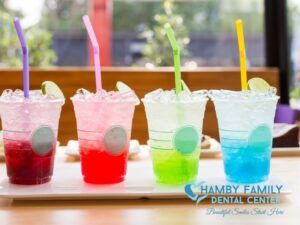The Negative Impact of Sugary Drinks on Oral Health
Home » Fuquay-Varina Dental Blog » The Negative Impact of Sugary Drinks on Oral Health
Soft drinks and sugar-sweetened beverages (SSBs) can cause many potential health problems. We tend to focus on issues such as obesity and diabetes and neglect to look at the oral health consequences of sugar-sweetened beverages. A growing trend, not only in the United States but also around the world, is that more young people are drinking SSBs than ever before.
Adolescents and young adults are the heaviest consumers of sugary drinks; however, even young infants and toddlers drink a lot of sugary drinks, primarily, for example, fruit drinks. SSBs are popular among adolescents due to factors such as pleasant taste, affordability, heavy marketing, and social influence. For more information, see “Get the Facts: Sugar-Sweetened Beverages and Consumption” on the CDC.gov website.
This is significant relative to oral health. At Fuquay-Varina dentists, we are seeing an increased number of patients in their teens and twenties who are presenting with high rates of tooth decay or “caries,” the medical term for cavities as a result of consuming large quantities of sugary drinks. A new term used in the dental professional world for a noticeably large amount of decay is a “bombed-out mouth.” In this article, we discuss the increase in SSBs, how sugar affects oral health, and how to prevent the onslaught of cavities.
The Sugar-Sweetened Beverages Trend
Sugar-sweetened beverages (SSBs) are drinks that contain added sugars such as sports drinks, energy drinks, sugary coffee beverages, sodas, vitamin-enhanced waters, fruit punch, and lemonade. SSBs are a leading source of added sugar in the U.S. diet. On average, according to the American Heart Association, adults in the U.S. consume 17-19 teaspoons of added sugar per day which is more than 2-3 times the recommended daily allowance. Three in five Americans ages 2 and older consume more than the recommended amount of added sugars.

This demographic may be drinking sports and energy drinks if involved in sports, working out at a gym, and other physical activities. Young adults may be drinking more coffee from coffee shops like Starbucks as a social status indicator that shows they can afford to splurge. Coffee has many options to offer like cold drinks, spicy drinks, non-dairy drinks, and coffee customized with syrups. The choices provide a way of self-expression tailored to a person’s tastes while filling the American need for instant energy. The increased number of available options contributes to the trend of drinking coffee with sugar enhancements.
Sugar and Oral Health
Sugar in food and drinks plays a major role in the development of dental cavities. Bacteria within the plaque use sugar as energy and release acid as a waste product, which gradually dissolves the enamel in the teeth. This makes teeth weaker and thinner and the likelihood of developing cavities becomes greater.
Sugary drinks are known as one of the most common dietary causes of tooth decay; they are also the number one source of added sugars in our diet, representing nearly half of all added sugars we consume. Carbonated soft drinks have increased dramatically in the last 60 years by tripling.
Sugary Drinks Harm Teeth
Bacteria in your mouth metabolize the sugar in sugary drinks, producing acid. As stated previously, the acid attacks the tooth enamel, leading to cavities. Then, the acid attacks continue with each sip of a sugary drink. And, finally, over time tooth enamel decays, which can lead to pain, infractions, and abscesses.
Drinks that are high in sugar:
- Carbonated soda
- Energy drinks
- Chocolate milk
- Smoothies
- Fruit punch or juice
- Sweetened coffee drinks
How to Protect Your Teeth
There are several things you can do to prevent tooth decay. But, regarding sugar, the action that has the biggest impact is reducing the sugar in your drinks and food. As we have stated, we consume too much sugar in our diets. Consider healthier options to quench your thirst such as water, milk, or unsweetened drinks. Natural fruit juices–real fruit juices–are another way to provide a bit of sweetness healthily. You can also cut the fruit juice with seltzer water to minimize the amount of sugar your family is consuming. Tea and coffee don’t contain sugar although they may stain your teeth. At the end of the day, water is the best drink for teeth.
Ways to reduce dental caries include:
- Brushing teeth thoroughly two times a day with fluoride-containing toothpaste as well as flossing each day at least once.
- Practice good oral care with proper brushing techniques.
- Reducing the amount of sticky food containing sugars, and rinsing the mouth with water if they are consumed.
- Reduce snacking, which helps reduce the production of acid in the mouth.
- Reduce the consumption of beverages sweetened with sugar.
- Only eat sugary foods at mealtimes.
- Eat foods for healthy teeth.
- Be sure to visit your dental professional for bi-annual dental exams.
Contact Us at Hamby Family Dental Center Today for Better Oral Health
Our team of dental professionals at your Fuquay-Varina dentist, Hamby Family Dentistry, is primarily focused your overall oral health. We can evaluate your oral hygiene routine and guide changes you can make for a healthier mouth. Schedule an appointment by filling out the form below or calling 919-552-2431.
